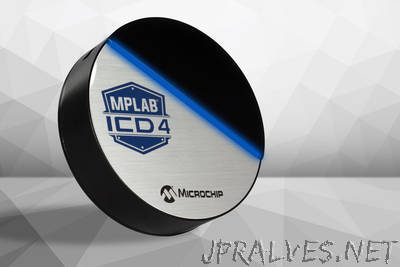
“Microchip Technology Inc. (NASDAQ: MCHP) today announced the MPLAB® ICD 4, an in-circuit programming and debugging development tool for Microchip’s PIC® microcontroller (MCU) and dsPIC® digital signal controller portfolios. The MPLAB ICD 4 debugger includes all the features of the popular MPLAB ICD 3 tool while adding increased speed through a faster processor and increased RAM. The MPLAB ICD 4’s significant improvement in speed is accomplished through a 32-bit MCU running at 300 MHz. The faster processing, along with an increased buffer memory of 2 MB, results in a product that is up to twice as fast as its predecessor. The puck-shaped MPLAB ICD 4 is housed in a durable, black case with a brushed aluminum top and is accented with an LED light strip to indicate debugging status. The tool features the following: A wider target voltage range, from 1.20 to 5.5 V; An optional 1 amp of power (using an external power supply); Selectable pull-up/pull-down option to the target interface; Configurable interface speed for optimized programming and debugging; Intelligent, robust interface with fault detection and immunity; JTAG debugging capability. Microchip’s MPLAB ICD 4 development tool is easy to use and supports all PIC microcontrollers and dsPIC digital signal controllers in Microchip’s portfolio through the MPLAB X Integrated Development Environment (IDE). This simplifies the design process for customers when they choose to migrate from one PIC MCU to another to meet the needs of their application. “Speed and flexibility are the most important factors when selecting a debugging tool,” said Rodger Richey, Microchip’s director of Development Tools. “The MPLAB ICD 4 reduces wait time—and in turn—improves debugging productivity. With speed, compatibility, durability, comprehensive device support and the award-winning MPLAB X IDE, the MPLAB ICD 4 again solidifies Microchip’s reputation as a leading provider of embedded debugging tools.””
